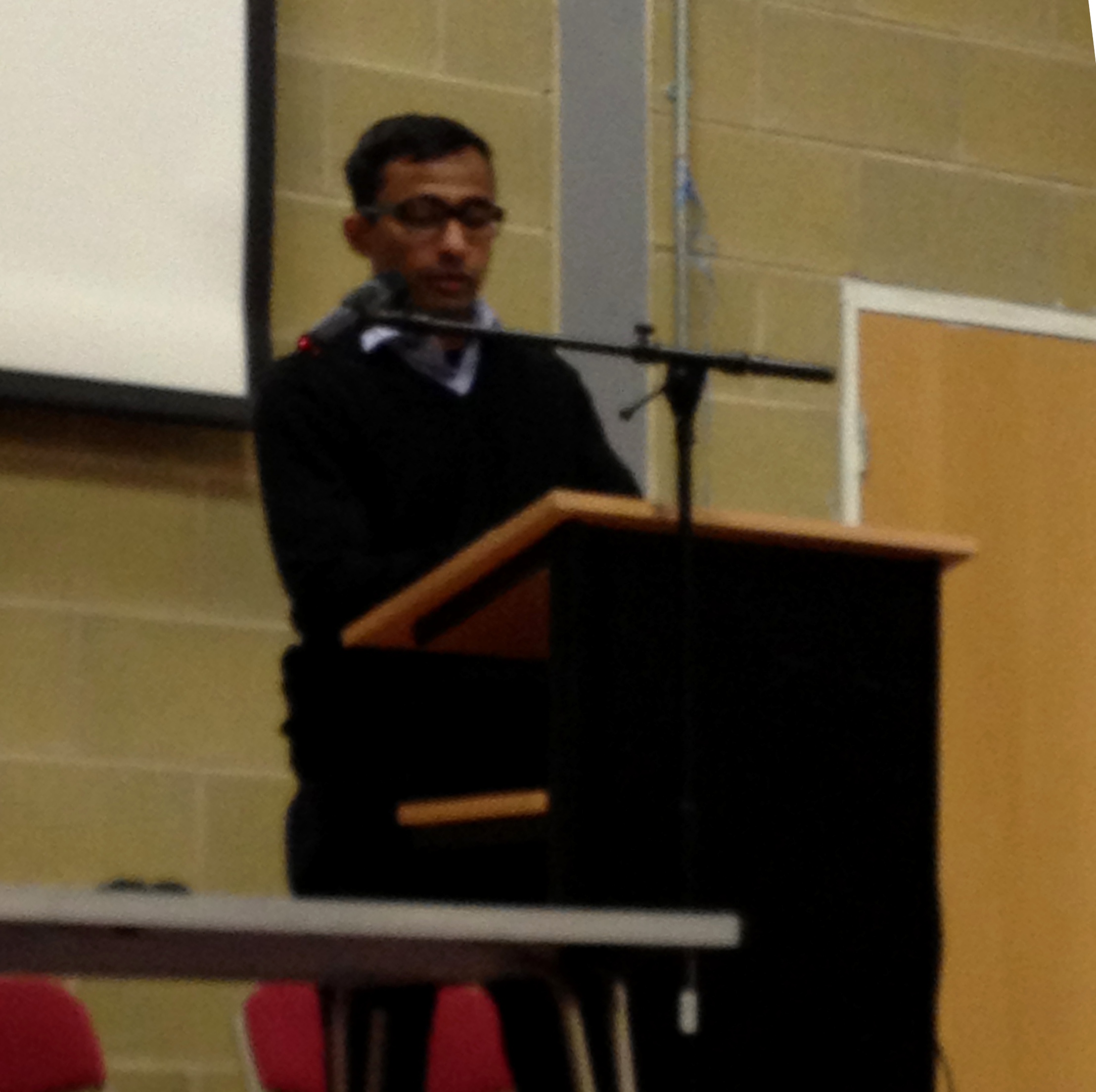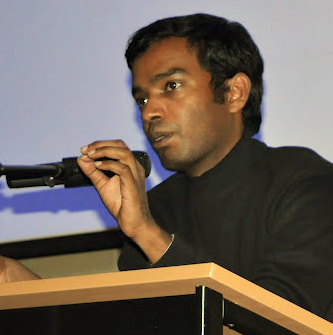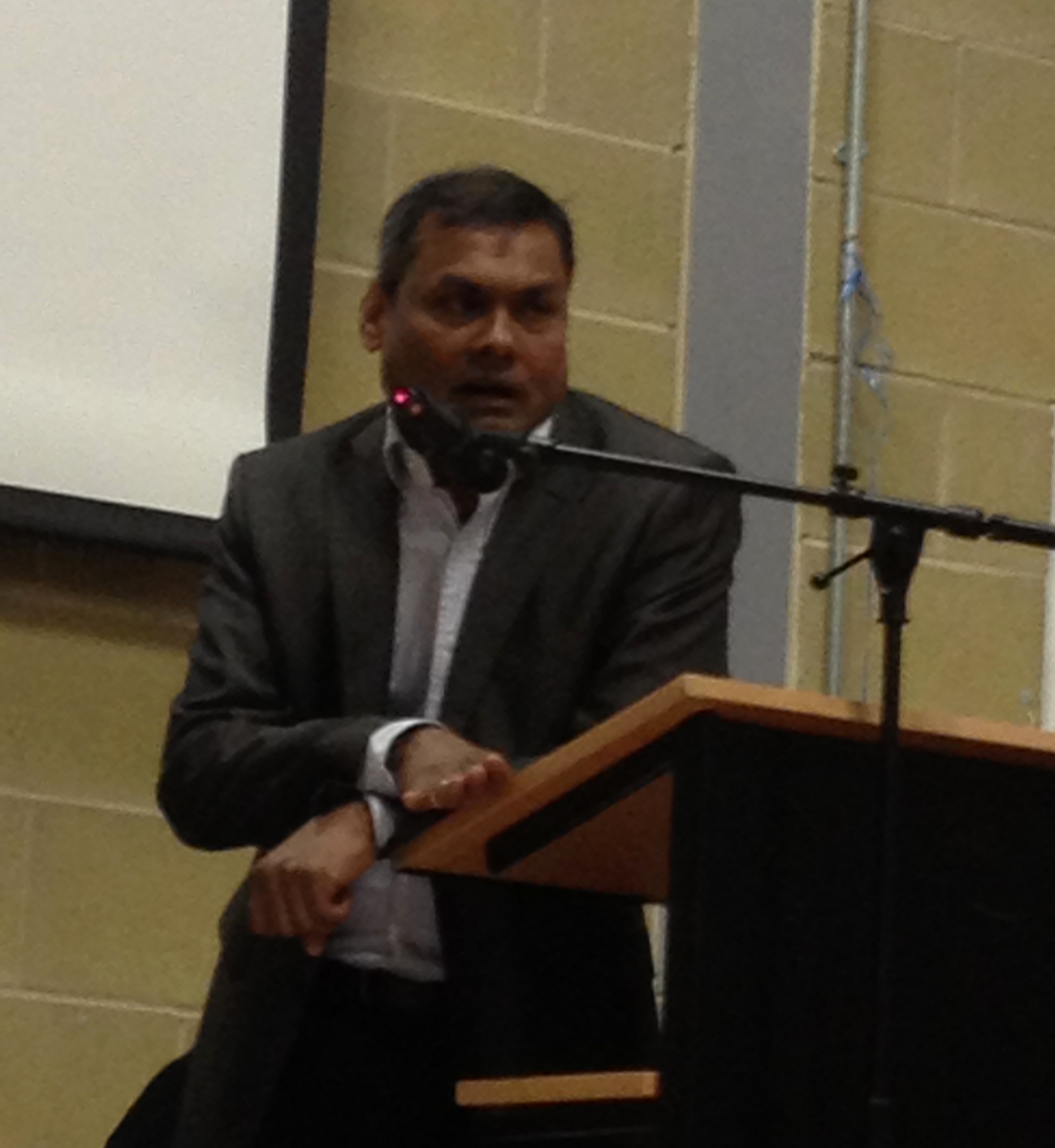|
|
|
Photograph TamilNet |
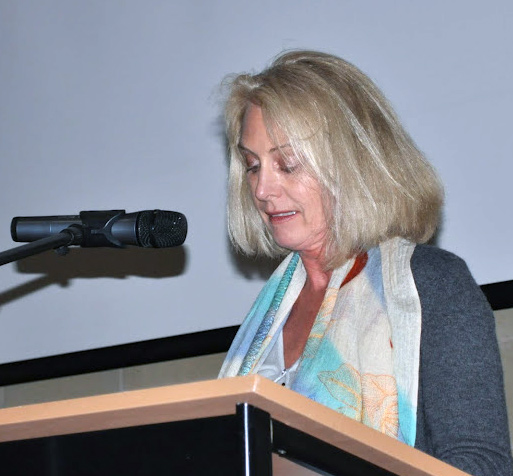 |
|
Bearne Arnestad, director of 'Silent Voices'. Photograph TamilNet |
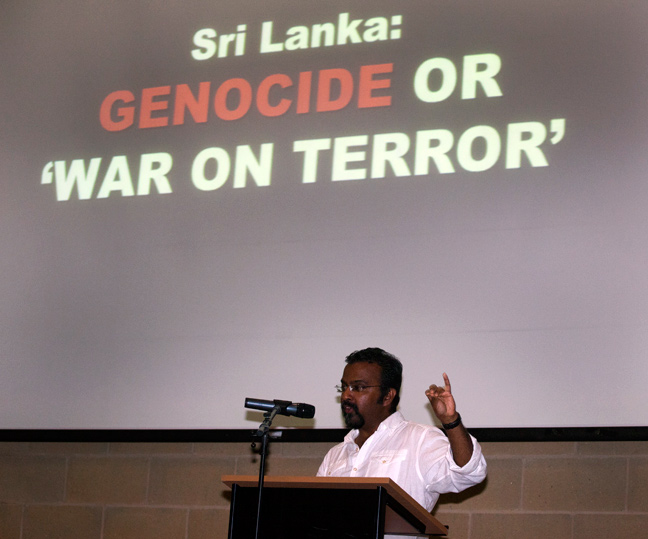 |
|
Bashana Abeywardane, exiled journalist. Photograph TamilNet |
|
|
|
Nirmanusan Balasundaram, exiled journalist. |
|
|
|
Vino Kanapathipillai, Tamil Guardian |
|
|
|
Karthick R.M, research student. Photograph TamilNet |
|
|
|
Sasithar Maheswaran, youth activist. Photograph TamilNet |
|
|
|
Gobi Ratnam, Oru Paper |
|
|
|
S.J. Fatimaharan, political commentator |
The life of 'Taraki' Sivaram Dharmeratnam, assassinated in 2005, was commemorated by journalists and activists in London on 6th May.
The event, organised by TamilNet, Journalists for Democracy in Sri Lanka (JDS) and International Association of Tamil Journalists (IATAJ), saw journalists and activists coming together to discuss the thoughts and writings of the late Sivaram, and included a special screening of the film by Beate Arnestad, 'Silenced Voices'.
K. Jeyachandran of TamilNet's editorial board, shared his memories of working with Sivaram, who was a senior editor at the news site before his death. Recalling Sivaram's significant contributions to TamilNet over the years, Mr Jeyachandran spoke of Sivaram's unwavering insistence on accuracy of reporting and writing. Highlighting the great lengths Sivaram had taken to develop the skills of junior journalists, Mr Jeyachandran described how Sivaram had taught regional reporters in the North-East essential IT skills such as the use of email and how to touch-type.
Bashana Abeywardane, an exiled Sinhala journalist and member of Journalists for Democracy in Sri Lanka (JDS), detailed how Sri Lanka had masked the genocide of the Tamil nation through 'war on terror' rhetoric. Noting that the Tamil freedom struggle was "unlike other conflict areas, the population was the insurgency", Abeywardene said, "therefore the entire population had become the target". Drawing on Sivaram's writings, Abeywardene said the events of 2009 was an attempt by the Sri Lankan government to make the people relinquish their political aspirations by reducing them to mere survival instinct.
Repeating Sivaram's statement that "counter insurgency is collectivised torture", Abeywardane reflected that "in Mullivaikal the torture was collectivised and the whole population was tortured" until the people of the Vanni were "willing to throw themselves at the military grateful just to survive".
The exiled Tamil journalist, Nirmanusan Balasundaram, sharing his memories of meeting Sivaram, said that Sivaram had become a symbol of resistance and a mentor to aspiring journalists. Drawing on Sivaram's words that journalism is a "job of commitment, courage and continuity, Mr Balasundaram asserted, "you murdered Sivaram but not his spirit".
Vino Kanapathipillai of the Tamil Guardian, shared her memories of Sivaram's close involvement with the newspaper and his role in developing the volunteers that ran it. Describing Sivaram as much more to the Tamil struggle than a journalist, Ms Kanapathipillai reflected on his firmly held view that the struggle was above all else was that of a nation facing oppression, not merely human rights or justice. She noted that despite having strong sympathy for many other oppressed nations, he had always prioritised the Tamil struggle.
Ms Kanapathipillai recalled how, as an activist, Sivaram had frequently engaged with the foreign office, intelligence officials and embassy staff, and how he had encouraged fellow activists to also engage in the "grey area of politics", dismissing those who accused him of being a 'CIA agent' as "self-appointed commissars".
Karthick R.M., a research student at the University of Essex from Tamil Nadu, criticised attempts to shift the central focus of the Tamil struggle away from genocide, through a focus on the individual rather than a collective, countering condemnation of the Sri Lankan army's brutality by arguing there was brutality on all sides, masking political rights over human rights, and refusing to acknowledge the nature of violence.
During a panel discussion, writers, activists and columnists, debated the question, 'Is Tamil nationalism in a crisis?', based on an article written by Sivaram in 2004. The panelists included, B.A. Cader, a Muslim activist and political commentator, the columnist Ithayachandran, political commentator S.J. Fatimaharan, youth activist Sasithar Maheswaran, and Gopi Ratnam, the editor of the London based newspaper, Oru Paper.
The discussion covered a broad range of themes and a diversity of opinions. Mr Maheswaran criticised diaspora groups who he described as scared of losing their credibility in the search to gain acceptibility, and stressed the need for activists to stand by the fundamental principles of the Tamil struggle. Mr Gopi Ratnam suggested that the diaspora groups should be more critical of the TNA and hold them to account, suggesting that it was the failure to do this which allowed the Tamil struggle to be remain in crisis.
Meanwhile, Mr Fatimaharan argued that it was the Sri Lankan government and not the Tamil struggle that was in crisis. Describing the Tamil homeland as built on dedication and sacrifice, Mr Fatimaharan said it belonged to all those who struggled to safeguard its people and its land. Making particular reference to second generation Tamil youth activists, he stressed that this included even those who cannot speak Tamil.
See also: 'Contributions of Sivaram remembered at Memorial Seminar London' - TamilNet
We need your support
Sri Lanka is one of the most dangerous places in the world to be a journalist. Tamil journalists are particularly at threat, with at least 41 media workers known to have been killed by the Sri Lankan state or its paramilitaries during and after the armed conflict.
Despite the risks, our team on the ground remain committed to providing detailed and accurate reporting of developments in the Tamil homeland, across the island and around the world, as well as providing expert analysis and insight from the Tamil point of view
We need your support in keeping our journalism going. Support our work today.
For more ways to donate visit https://donate.tamilguardian.com.


